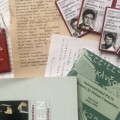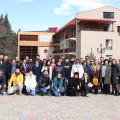What myths did this recent Artsakh War destroy for you as a writer?
The first thing it destroyed was that false, military-patriotic pathos-rich discourse, which our leaders were feeding the Armenian public for more than two decades, trying to avoid the real issues that existed in the army and society, which needed solutions as early as possible. Despite this military-patriotic pathos pushed by the political parties and official figures, we bore witness once again to real patriotism and bravery by a generation that had started to see the world during the relative conditions of that era of no-war/no-peace, when instead of being taught in schools and universities about our past victories, they were told that the years immediately after independence were cold and dark, with social injustice fueled by the evil ambitions of savage capitalism. But those martyred youths will continue to cause guilt among those of us that are still alive, because we were unable to do everything possible to prevent this war. They went to fight, they displayed real patriotism, and they were perhaps the ones that had never made any such patriotic declarations, they were against this fake nationalism and pathos, they loved not a historic homeland that had been imagined in virtual conditions but their real motherland where they lived and created their lives, where they were recognized as a representative of a victorious, constructive nation, not the descendants of a people that had been subjected to genocide. The war became a political gravesite for all the political figures and political scientists that—even during the war and immediately after it, when the parliamentary elections were underway—did everything they could to grab a piece of the political pie. And it doesn’t matter what percentage of them ended up in Parliament and who did not. All of them, every player, proved once again that they have nothing new or creative to say or do in these non-standard times. They are a thousand miles away from western values of any kind, they are people who have been living with eastern duplicity and trickery in their relationships with others, but here they were talking about western values for the thousandth time, while others were desperately clinging to the blessed feet of the Russians, instead of falling silent, pondering things, and coming to wise conclusions. I hope that they will no longer be able to feed the new generation these myths, just like you can no longer pour spoiled wine into new barrels.
Many years ago, in 2002, when Hrant Matevosyan was asked about what he would say to those going to the frontlines if a war broke out the next day, he replied, “I would say, ‘Victory and nothing else. Defeat is an old hag that clings to your back…’” What thoughts have come to the fore after the Second Artsakh War and our defeat that followed? How do you plan to reflect this in your writings?
Throughout the war and after it, I have been thinking about how good it is that Hrant Matevosyan and our other great Armenians are no longer alive and cannot see this tragedy, that they only got to see our country’s victory and the rocky road of independence. How would they be able to bear this tragedy, what message would they give to the young men going to war? It is difficult to say. The Second Artsakh War will, sooner or later, be sufficiently reflected in our literature, with its heroes and antiheroes, real stories that have now become documentary pieces. And the task of a modern writer must be to find the healthy seed among the chaff, to create literature that supports the upbringing of healthy citizens, rather than pseudo-patriotism. There is a need today to read Hrant Matevosyan’s works again and to understand them. In Hrant’s own words, “…two-days-worth of bread, the perspectives of two days of existence… what a wonderful people rose from the truly bitter times of the twenties – the people of my parents. With just a little effort directed at ourselves and perhaps the illusion of two-days-worth of time, see what a direct, just, and brave people will rise – the people of my children.”
Can a writer’s words and text play a role in peacebuilding initiatives and succeed? Will these words be understood and accepted?
If their hearts are on their sleeves, if they are not faking it, then yes, a writer can have the mission of waking up their people, they can save the world. Why did Orhan Pamuk, the Nobel Laureate for Literature, who called the 1915 tragedy of the Armenians a genocide, thus opposing the official position of the Turkish state, remain silent during the months of September to November 2020? Many of us were waiting for Pamuk to speak, to say something that would perhaps be a reprimand or a wake-up call, especially during the early days of the war when the international community was duplicitously silent. I wonder what his conscience, as a writer and intellectual, was telling him to do, when he was quiet at that time and in the period that followed.
I wish that Armenian writers have the courage to address this past war correctly, without lamentation or concealment, without the insecurities of victimhood. That can then open up a small path toward peace.



